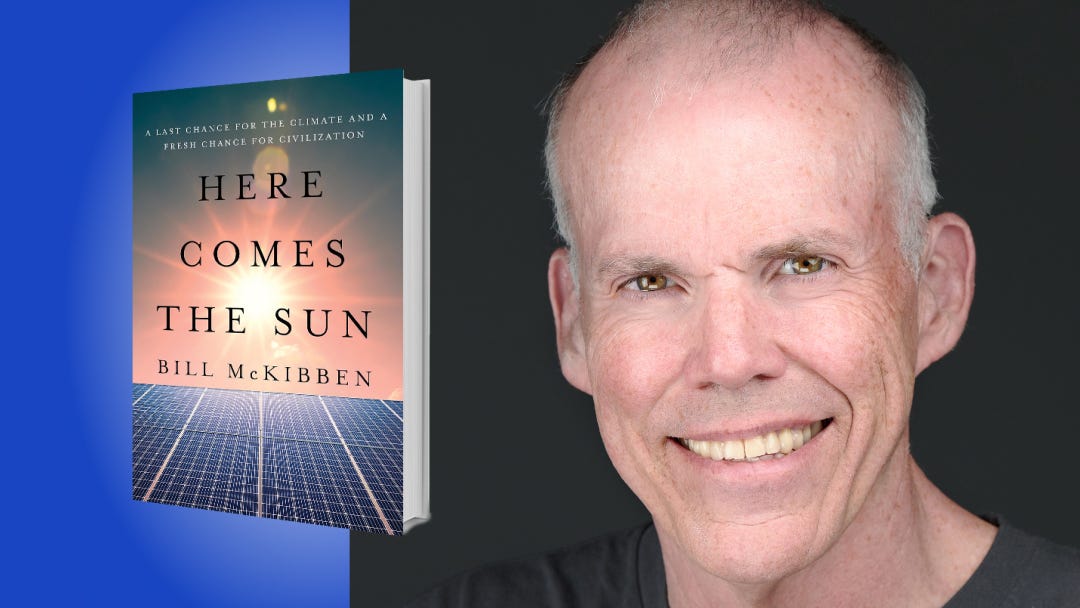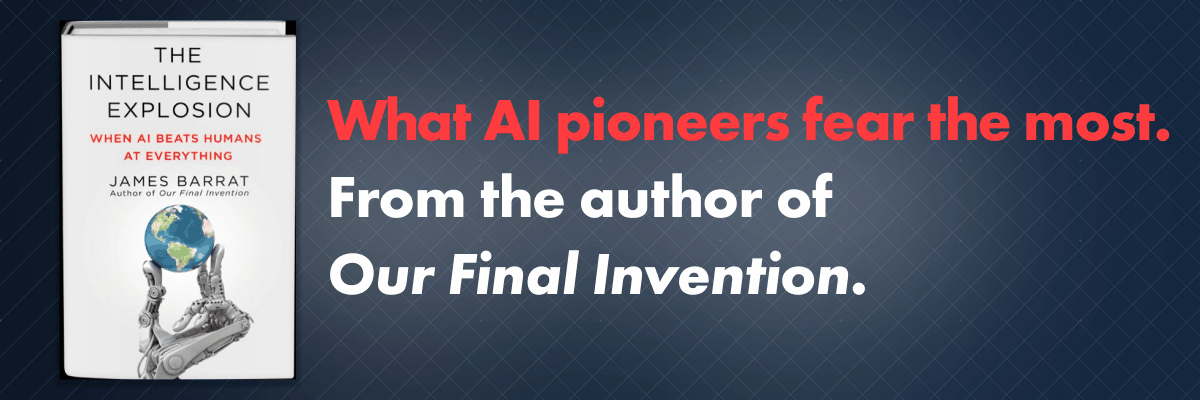Here Comes The Sun—Just In Time
Pioneering environmentalist Bill McKibben says we have only one shot at preventing runaway climate change.

Listen now on Spotify or Apple Podcasts:
We’ve known about climate change for decades, even if most of the so-called solutions have felt too slow, too expensive, or too politically fraught. But pioneering environmentalist Bill McKibben says we’ve been overlooking the answer right in front of us—or rather, right above us: the sun. In his new book, Here Comes the Sun: A Last Chance for the Climate and a Fresh Chance for Civilization, Bill argues that solar power—once dismissed as niche and impractical—is now growing faster than any energy source in history. It’s cheap, it’s everywhere, and it’s the only solution that can scale quickly enough to meet the climate emergency. Pick up Bill’s book on Amazon or check out five of his big ideas below.
1. Solar power is going crazy.
Solar power is now growing faster than any energy source has ever grown in history. It had been on a very slow, somewhat steady up-ramp for a long time. The first solar cells were invented in America in 1954 at Bell Labs in New Jersey. But in 2023 (sometime around June), we suddenly saw a huge spike.
That year, we reached a point where humans were installing a gigawatt-worth of solar panels daily. A gigawatt is roughly equivalent to the output of a nuclear power plant or a coal-fired power plant. That much was going up every 24 hours. Since 2023, the number has decreased to approximately every 18 hours.
In places where it has been done most earnestly, we’re now seeing remarkable results. California generates more than 100 percent of its power for long stretches of each day from renewable energy sources. Because batteries allow for using stored energy at night, batteries have undergone the same kind of super-rapid growth. Those batteries that have been soaking up excess sunshine all afternoon are often the biggest sources of supply on the California grid.
2. Solar power can scale fast enough to give us climate hope.
My book, The End of Nature, was the first book about what we now call climate change. Since then, nature has been doing what physicists said it would do: heating up rapidly because of the carbon that we’re pouring into the atmosphere. June 2023 was the month when humans surpassed a gigawatt-worth of solar panels and also when the planet experienced the hottest temperatures ever recorded in at least 125,000 years.
This spike that began in the summer of 2023 continues today. Nearly every month since has been “the warmest”—whether it’s the warmest April, the warmest August, or other months. 2024 was even warmer than 2023. So far, 2025 is following the same trend. As a result, we’re witnessing very dangerous effects. The Jet Stream and the Gulf Stream are starting to flicker and falter.
“Nearly every month since has been “the warmest”—whether it’s the warmest April, the warmest August, or other months.”
Other than the fast rollout of renewable energy, nothing else will scale fast enough to affect that momentum. Fast being the operative word here, because climate change is a timed test. It takes a dozen years to build a nuclear power plant. Half that to put up a gas-fired power plant. But you can build a big solar field or wind farm start-to-finish in a year and have it produce power. Solar is our one real chance.
This week, Book of the Day is brought to you by The Intelligence Explosion, a clear, unsparing look at generative AI—its upsides, blind spots, and real-world risks. Get your copy today.
3. If you’re worried about autocracy and fascism, solar power can help.
It’s worth remembering that as long as we rely on fossil fuels, we rely on a resource that’s only available in a few places. Therefore, the people who control those places get more money and hence more power and authority than they should have in our country. The Koch Brothers were the single biggest oil and gas barons, controlling more pipeline and refining capacity than anyone else. They’ve used their winnings to degrade our democracy abroad. Vladimir Putin is perhaps the biggest hydrocarbon baron, and he’s used his winnings to launch a land war in Europe in the 21st century.
It’s incredibly nice to think about a commodity (sunshine) that can’t be hoarded, that’s available everywhere, and that no one will ever fight a war over. To have any hope of dealing with the fast-forming autocracies on this planet, we have to give communities and localities the ability to produce their own energy.
4. Renewable energy has become incredibly cheap.
Over the last decade, the cost of renewable energy has decreased by approximately 90 percent. That reduction in the price is the reason we’re having this conversation. It’s what’s allowed solar to emerge as an incredibly fast-growing source of power on planet Earth.
The way to think about solar is not so much as a commodity, but as a product of human intelligence. When you burn coal, you are burning a rock. However, when you harness the sun, you are harnessing the human ability to innovate and iterate. Yes, you need a certain number of minerals to make it work, but not that many. You put some lithium in a battery, and it works for the next quarter-century. And when the battery itself begins to degrade, we have the capacity to recycle that lithium easily for producing the next round of batteries.
“The way to think about solar is not so much as a commodity, but as a product of human intelligence.”
The Rocky Mountain Institute stated in the fall of 2024 that we should be finished with mining for critical minerals by 2050 as part of the energy transition, as we can then rely on a steady stream of recycled minerals to sustain us. Coal, by contrast, gets burned up, and there is always the need to go mine some more. Forty percent of all the ship traffic on Earth, at any given moment, is just shipping coal, gas, and oil back and forth across the seas to be burnt. Sun and wind travel across the planet daily and for free.
5. This is an epochal moment for human beings.
This moment is as significant as the moment when we figured out how to harness fossil fuels, or perhaps even the moment when we first began learning about agriculture. Solar power allows us to put out almost every fire on Earth. Humans and fire have been synonymous for at least 700,000 years.
Darwin said that fire and language were the two things that made human beings special. Once we harnessed the combustion of coal, gas, and oil in the Industrial Revolution, that produced modernity. But it came at an enormous cost: The complete disruption of the climate system and an existential threat to the planet.
Nine million people a year die from breathing the combustion byproducts of fossil fuels. That’s one death in five on this Earth. It’s nice to live in a moment when we can look up at the sky and realize that we no longer need to set things on fire because the good Lord was kind enough to hang a large ball of burning gas 93 million miles up in the sky. It not only provides us with light and warmth, but also with all the power we could ever need through photosynthesis. The only question is whether we’ll utilize that power quickly enough, grasp the ability to change quickly enough, and do so before we’re overwhelmed by the forces of climate change.






This was a fantastic read, and I didn't think of the dictator/autocrat angle.
I am old fashioned. I do not believe that humans have much to do with climate, despite all the drama on the left about it. I think we are being sold any bill of goods the ubiquitous 'they' can imagine, and that their issue is actually control.
I am a geologist. The old rock hammer and Brunton compass kind. I am not an activist for anything. I think the earth is far bigger, older, and more interesting than we can imagine. The planet has gone through numerous climate cycles over the past four and a half billion years. Many happened before we were here. We are only here for a little while. We should enjoy and be amazed.
We have very little power over the planet. Rather, the planet birthed us, among numerous other species. I think the greatest biological change happened in the oxygen revolution, and that much of the drama earth encounters has to do with where the planet is in space and time. There have been five major planet killing encounters, and had we been there, we would not have had any power to do anything about them. Species adapt until they can't. That's life.
I use solar power in Arizona because it makes economic sense, not because I think we are going to save the earth. However, the wind turbines are a disaster for animal life and the substances used are toxic and noxious.